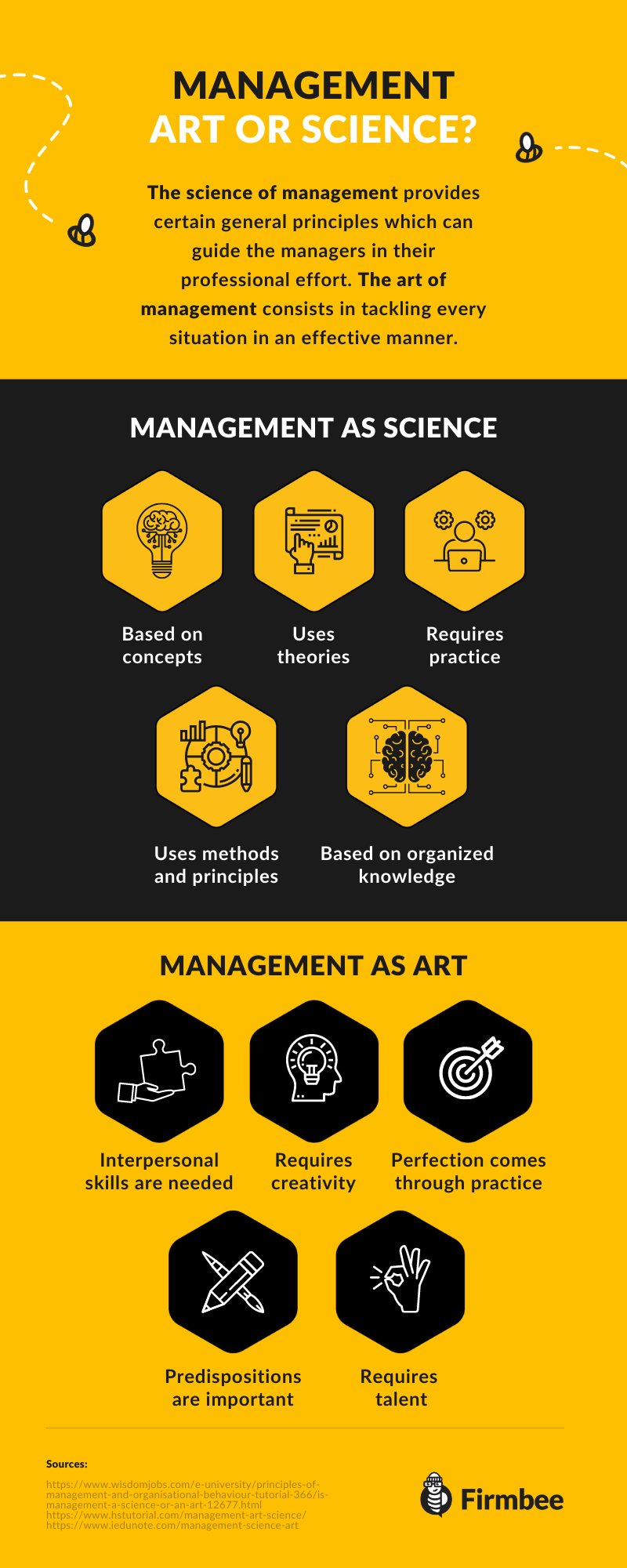Is management an art or science? Does it have to be both in order to contribute to profit generation and the company’s development? The completion of specific tasks in a firm is carried out by smaller systems operating within the company. One of them is the area of management, which opens up the possibility for ever more efficient objective fulfillment. Being good at management requires not only having appropriate knowledge, years of practice, but also an open mind, capable of creative creation.So, is management: an art or a science, or maybe both?
Is management an art or science? Table of contents:
- Management as art
- Management as a science
- Is management an art or science?
- Management as an art and a science at the same time
- FAQ. Questions and answers
Management as art
A closer look on the definition of art. Art, according to encyclopedic definitions, is a certain ability and skill to produce a piece using a unique or special individual ingenuity.
To manage an enterprise or at least a group of people working within a certain entity, requires expert knowledge, skill, and talent to be a manager. In this sense, management can be understood as an art. Managing a team requires combining acquired skills with personal predispositions.
Even the brightest mind that has acquired a great deal of knowledge about leading a team will not perform effectively if it is not gifted to lead a group of people. Management will be an art meaningfully similar to the art of anticipating or organizing, not to the art in its cultural context like music or film.
The art of management is also an innate skill
The ability to manage effectively is therefore a multifaceted, diverse set of qualities combined to form a coherent whole. A person who has no talent for singing will never become a good singer. Also, in the context of becoming a manager, not everyone will be successful.
But does this help in answering the main question: Is management an art or science?
Management as an art is the ability to delight, move or evoke other emotions based on the reproduction of reality.
A manager must have technical, social, conceptual, communicative, decision-making and organizational skills. This, in turn, requires from him not only extensive knowledge but also talent, defined as art.
Management as a science
How is management similar to science? Science is a very broad concept, variously defined in the context of sources. According to the encyclopedia, it is a body of human knowledge, a set of systematic views, or a discipline relating to a specific area of knowledge.
Management in this context can be combined with science: the more so because it is the subject not only of scientific debates but also a separate field of higher education. Management as a science fulfills its defining assumptions by referring to the decision-making process itself.
In this sense, management is a holistic process oriented towards the successive expansion of knowledge, based on observation and analysis (scientific methods) through the accumulation of experience.
Is being a manager like being a scientist?
A person managing an enterprise becomes not only a reproducer of already acquired knowledge but also its original creator. Today’s managers set trends, formulate new conclusions, improve existing management systems. Innovative management can be fluid, then it changes depending on the circumstances and conditions.
Traditionally understood management, on the other hand, is characterized by a strong theoretical foundation and therefore has more features of science than art. It relies on accumulated knowledge, organizational networks, economic strategies, or management models.
The scientific nature of management can be observed in the context of planning technological systems, e.g. in construction.
Is management an art or science?
The legacy of science is the basis of management. In management sciences, the achievements of the overall scientific heritage are readily used. The extracted knowledge is used to create models in the context of producing management systems with practical characteristics. Management models are based on concepts and paradigms that directly link them to science.
This, in turn, proves that management is a science in the first place, as it unquestionably benefits from its achievements. According to many scientists, management cannot be called an art. But is this the only good approach? Is management an art or science?
Management as an art and a science at the same time
A good manager must be a visionary, have a flair, and possess innate leadership skills. It is difficult to imagine management as an art in the creation of crisis management models or the creation of housing plans. However, management is such a broad field of knowledge that it can be easily ascribed to the characteristics of art. We are talking, first of all, about situations connected with managing a company.
This proves that management as a science and management as an art can go hand in hand, without being mutually exclusive. However, the foundation is science, i.e. systematized theoretical knowledge, without which management success cannot be achieved.

We hope the question: “Is management an art or science?” has been answered as detailed as possible. Do you have your own thoughts on this topic? If yes, let us know in the comment section below.
Want to stay in touch with our content? Join our Facebook community
Author: Andy Nichols
A problem solver with 5 different degrees and endless reserves of motivation. This makes him a perfect Business Owner & Manager. When searching for employees and partners, openness and curiosity of the world are qualities he values the most.
The most important questions
-
What is management?
Management is one of the subsystems of enterprise functioning. It is a set of activities, decisions, orders, processes, whose application is to ensure the achievement of objectives set by the company.
-
Why can management be defined as art?
Efficient management of a group of people requires personalized personal skills, which are not always possible to acquire. For this reason, management can be an art of combining different skills, which not everyone can put into practice.
-
Why are academics reluctant to call management an art?
Multiple mathematical, computer, and analytical models used in management, or drawing on isolated scientific theories render management more as a science than as an art. Supporters of this view emphasize, that currently due to the achievements of science, such as artificial intelligence, the “artistic” part has diminished.


















